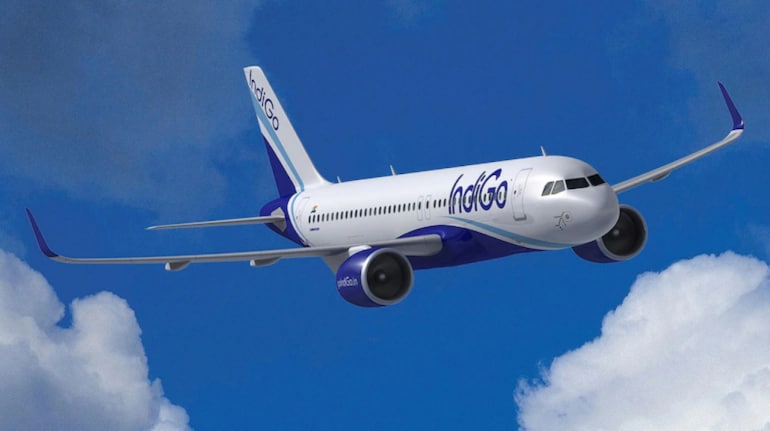



In the Indian aviation sector, someone's pain has always been another's gain.
The grounding of Wadia-group-backed Go First has now become another opportunity that the country's largest airline, IndiGo, used well, as it managed to record its highest-ever domestic market share of 61.4 percent in May.
IndiGo saw a near-400-basis-point (bps) jump in market share in May compared to April, while all other airlines in India combined saw a 180-bps jump in market share over the same period.
Similarly, IndiGo carried 7.04 lakh more passengers in May compared to April, while all other carriers carried around 2.4 lakh more passengers in May compared to April.
Most of Go First's market share of 6.4 percent carrying 8.29 lakh passengers in April, went IndiGo’s way last month.
"IndiGo has leveraged its strong position and made the most of the closure of Go First," aviation analyst Ameya Joshi said.
Citing the example of the Delhi-Leh-Delhi sector, where Go First had a sizeable presence, Joshi while referring to data from the Directorate General of Civil Aviation (DGCA), said that nearly 25 percent of the seats sold by Indigo on this route belonged to the highest bracket, earning over 30 percent of the revenue from the sector.
Similarly, IndiGo sold 10 percent of its seats in the highest bracket on the Mumbai-Srinagar route, 4 percent on the Bengaluru-Delhi route, and 3.4 percent on the Delhi-Chennai run, clocking 8.8 percent, 8.7 percent, and 6.2 percent of its revenues, respectively, on these sectors, DGCA data shows.
Similarly, Jinesh Joshi, Research Analyst at Prabhudas Lilladher, said that Indigo has been the biggest beneficiary of Go First filing for insolvency.
"Indigo has been the biggest beneficiary of this development, having witnessed a 390 bps MoM (month-on-month) improvement in market share to 61.4 percent. "An improvement in market share and declining crude prices (ATF price is down 9 percent over the last two months) bodes well for Indigo," Joshi said.
But how did IndiGo grab the lion's share of the market after the fall of Go First?Market experts, insiders, and industry participants attribute IndiGo's market share gain to its large fleet size, extensive domestic network, pilot pool, and quick decision-making.
An industry insider who actively looks at the network of domestic Indian carriers told Moneycontrol that, following the collapse of Go First, IndiGo increased its flights on all routes that Go First was serving.
"IndiGo launched around 30 new weekly flights in total across all the routes, with a significant presence of Go First," the source said.
He added that IndiGo had that first-mover advantage in this case as the airline catered to all routes that were serviced by Go First domestically.
"IndiGo had slots at all airports Go First was flying to and increased its capacity without waiting for new slots to be assigned, unlike other carriers," the source said.
A slot is permission given by a coordinator for a planned operation to use the full range of airport infrastructure necessary to arrive or depart at an airport on a specific date and time.
Similarly, an official from a domestic carrier said that IndiGo’s fleet is more than twice the size of any other airline in the country.
"IndiGo operates around 260 planes domestically compared to the 90-odd by Air India and Air India Express, the 50-odd by Vistara, the 35 planes of SpiceJet, and the 20 of Akasa Air," the official said.
IndiGo's large fleet gives it the flexibility to restructure its network with a lot more ease compared to other players, he added.
Furthermore, the official said that IndiGo's ability to operate its aircraft for an average of 12–14 hours daily due to its large pool of pilots also helps the airline increase the number of flights when needed.
"Most other airlines have an average sweat time of 11–12 hours daily for their aircraft, while IndiGo manages to sweat its aircraft for 12–14 hours daily. That is where the advantage lies," the official said.
Similarly, another industry insider said that IndiGo is adding aircraft to its fleet faster than any other carrier in India. He added that IndiGo added five new aircraft and also took delivery of five LEAP-1A engines for its grounded fleet in May.
"IndiGo took expedited delivery of five LEAP-1A engines in May which were earlier meant to be supplied to Air China," the second industry insider said.
In comparison, Air India, SpiceJet, Akasa Air, and Air Asia India did not add new aircraft to their fleets in May, while Vistara took delivery of one new aircraft.
A market expert working with an investment bank who did not want to be named said that the fact that both IndiGo and Go First operate Airbus A320 aircraft made IndiGo the natural choice to replace Go First on all its routes, especially at smaller airports like Leh and Srinagar.
"IndiGo's pilots were already trained in flying to these locations, which made them the natural successor once Go First flights stopped. Other airlines would have to train their pilots to fly to these spots," he said.
Discover the latest Business News, Sensex, and Nifty updates. Obtain Personal Finance insights, tax queries, and expert opinions on Moneycontrol or download the Moneycontrol App to stay updated!
Find the best of Al News in one place, specially curated for you every weekend.
Stay on top of the latest tech trends and biggest startup news.